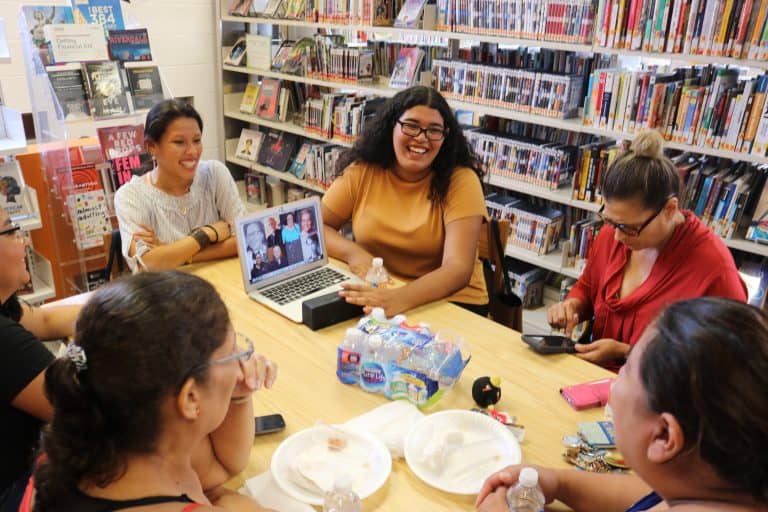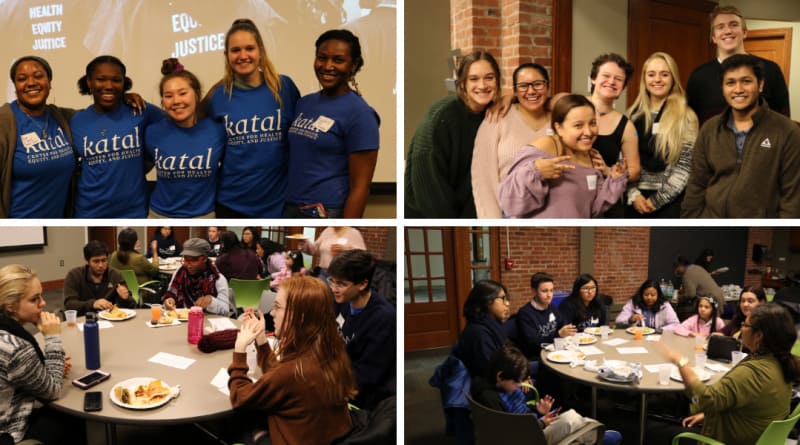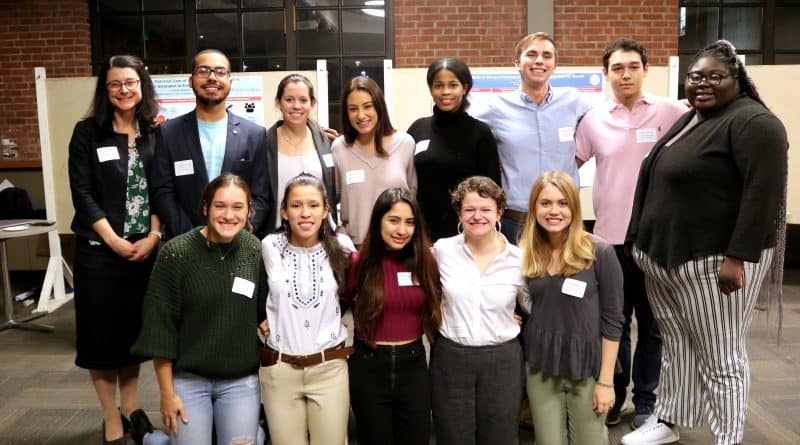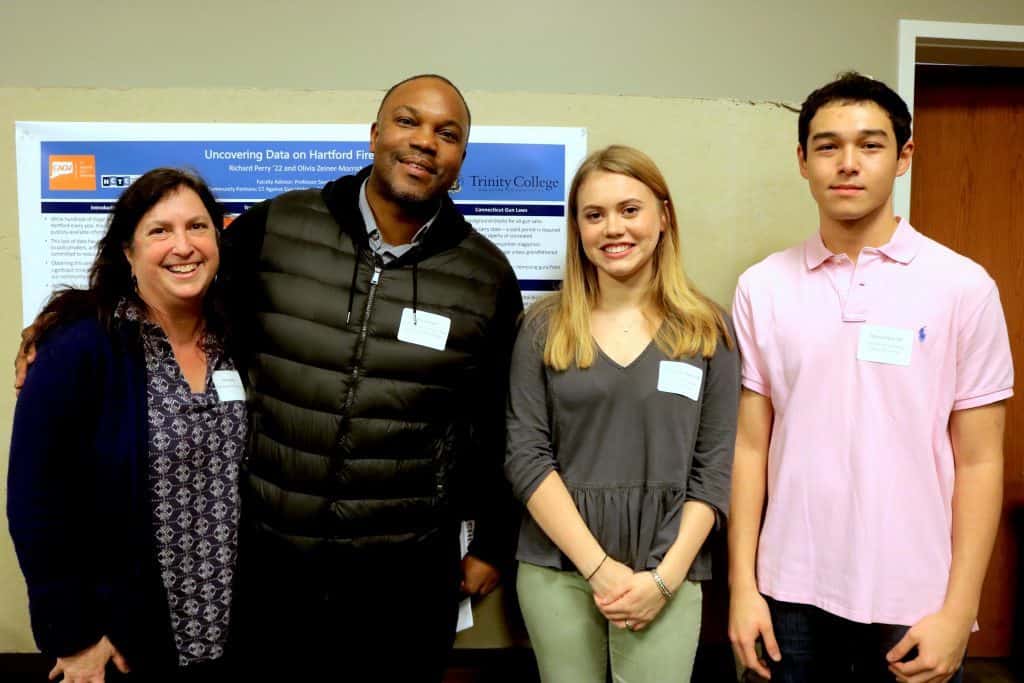Students Engage with Hartford Organizations through Community Learning at Trinity
The classroom extended far beyond campus for students who took part in Trinity College’s Community Learning experiences during the fall 2019 semester. In one opportunity, the Community Action Gateway, first-year students have the opportunity to engage with the city of Hartford through community-based research and social change projects. After their first year, students may apply for another specialized opportunity: the chance to become Community Learning research fellows, who collaborate with Hartford-area community partners and Trinity faculty sponsors on research or creative projects.
Gateway alumna Wendy Salto ’22 said, “In the Community Action Gateway, you get to learn about these Hartford stories you wouldn’t typically hear on campus. Once people do Community Action, I know they can’t go back to not knowing what’s going on in Hartford. Now I feel lucky when I’m in a class that has a community component.”

The Office of Community Learning, which is part of Trinity’s Center for Hartford Engagement and Research (CHER), fosters academic collaborations between Trinity students, staff, faculty, and local organizations in metropolitan Hartford. By bringing the classroom into the local community, students engage with the city in projects that deepen learning, promote civic engagement, and create mutually beneficial relationships with community organizations. Trinity faculty members offer more than 20 Community Learning courses every semester.
Community Learning courses include components of experiential learning, collaborative partnerships, and perspective-building relationships that students form with community partners outside of their classroom to gain new perspectives on local and global issues. Students who take part in Community Learning learn to draw meaningful connections between their liberal arts education and the lives of community partners in the Hartford area and beyond.
Community Action Gateway
First-year students interested in challenging social inequalities are encouraged to apply to be part of the Community Action Gateway. Students participating in the Gateway learn about different ways of creating social change through experiential learning projects; develop skills to identify and develop solutions to pressing social challenges; and become part of a dedicated community of students, faculty, and community partners committed to social change in and beyond Hartford. These students have the chance to design and execute community-based research and social impact projects related to: education; housing; economic development; language, culture, and identity; and social inequality.

At the end of the fall 2019 semester, Community Action Gateway students shared their final 1-minute video projects they made with five Hartford community partners: the Connecticut Women’s Education and Legal Fund; Night Fall; Make the Road CT; Public Allies CT; and the Katal Center for Health, Equity, and Justice. The room was filled with community partners, current Gateway students and alumni, and CHER team members who enjoyed dinner together and reflected on the different ways social change is happening in Hartford and how to tell that story.
Makayla Boucher ’23, who spent the semester working with the Katal Center on “Community Organizing and Building Power,” said, “As somebody who wants to continue to learn about nonprofits and community organizers and see how they change the communities around them, working with Katal was just such an inspiring experience. Seeing that change can start just with a small community conversation, and then go on to change policy and affect so many people, was just really inspiring.”
After working with the Connecticut Women’s Education and Legal Fund on “Legal Education, Public Policy, and Leadership,” Reagan Flynn ’23 said, “When you first start Community Action, it can be overwhelming to meet so many new people and figure out the bus and how to get around and film for a video, but then you meet your community partners and build your own relationships and get out in Hartford. I really wish more people had this kind of experience early on in college.”
Community Learning Research Fellows

Research fellows work solo or in small teams on semester- or year-long projects, which must be connected to a credit-bearing activity—an independent study, internship, community-learning course, or senior thesis/project—supervised by a faculty sponsor during the fall semester. Community partners may include non-profit organizations, neighborhood advocacy groups, government agencies, or educational institutions. To be eligible to apply for this competitive program, Trinity students must be rising sophomores, juniors, or seniors who have already completed a Community Learning course or participated in a community engagement project while studying abroad.
Each week, the fellows explore topics including: identifying a question and designing a research project; communicating a research plan; developing good interview skills and techniques; analyzing and visualizing data; designing visual presentations and posters; and managing expectations and addressing challenges in collaborative projects. Throughout the semester, the fellows worked closely with Associate Professor of Psychology Laura Holt ’00, TA Samantha McCarthy ’21, community consultant James Jeter (a Trinity Individualized Degree Program student), and Trinity faculty advisors to design and execute their community-based research projects.

The Community Learning Research Fellows presented the results of their semester-long projects recently at Trinity’s Hallden Hall. This semester’s fellows and their projects were: Emily Schroeder ’20 – “Community College Student-Parents: Experience, Persistence, and Outcomes” with CT Early Childhood Alliance (CECA); Isabelle Alexandre ’20 – “Examining Differences in Maternal Care of Women with Medicaid vs. Private Insurance: Phase 1” with YWCA Hartford; Alejandra Zaldivar ’20 – “State of Bilingual Education in Hartford: Opportunities for Growth” with City of Hartford Councilwoman Wildaliz Bermudez ’04; Jackie Monzon ’20 – “Cultural Variation in Parents’ School Engagement: Evidence from the Jubilee House” with Jubilee House; Brenda Ordonez ’22 – “Challenges Encountered by Adult ESL Tutors in the Classroom: A Study of ESL Resources at Jubilee House” with Jubilee House; Olivia Zeiner-Morrish ’22 and Richard Perry ’22 – “Uncovering Data on Firearms Recovered in Hartford” with CT Against Gun Violence and Hartford Communities that Care; William Tjeltveit ’20 – “Modeling Visitation at Coltsville National Historical Park” with National Park Service; Eleanor Faraguna ’21 – “Organizing Strategies for Comprehensive Sexuality Education Campaigns in Connecticut” with NARAL Pro-Choice Connecticut; Renita Washington ’22 – “What do Higher Socioeconomic Families Value in Child Care Centers?” with Trinity College Community Child Care Center (TC4); and Manny Rodriguez ’20 – “Connecticut Pre-K Policy, Parental Choice, and the Trinity College Community Child Center” with TC4. Click here to see their research summaries and final presentation posters.
“These fellows have taken significant leadership roles in their own learning this semester and we are so pleased to see them joining a group of dedicated faculty, staff, students, and community partners who are committed to Hartford,” said Community Learning Director Megan Faver Hartline.
To learn more about Community Learning opportunities at Trinity, click here.
